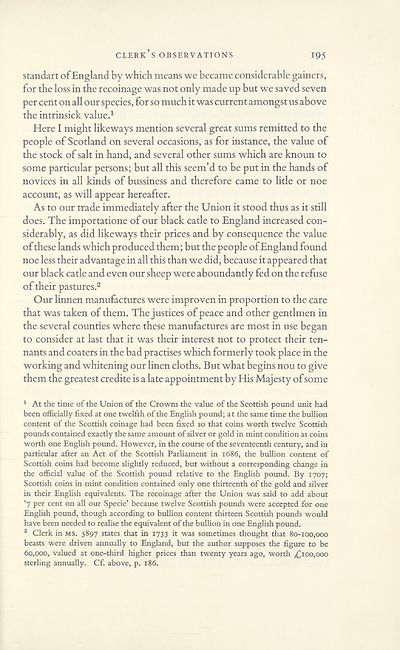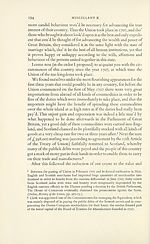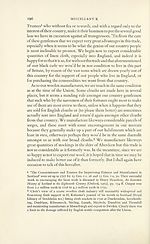Series 4 > Miscellany of the Scottish History Society
(220) Page 195
Download files
Complete book:
Individual page:
Thumbnail gallery: Grid view | List view

clerk’s observations
195
standart of England by which means we became considerable gainers,
for the loss in the recoinage was not only made up but we saved seven
per cent on all our species, for so much it was current amongst us above
the intrinsick value.1
Here I might likeways mention several great sums remitted to the
people of Scotland on several occasions, as for instance, the value of
the stock of salt in hand, and several other sums which are knoun to
some particular persons; but all this seem’d to be put in the hands of
novices in all kinds of bussiness and therefore came to litle or noe
account, as will appear hereafter.
As to our trade immediately after the Union it stood thus as it still
does. The importatione of our black catle to England increased con¬
siderably, as did likeways their prices and by consequence the value
of these lands which produced them; but the people of England found
noe less their advantage in all this than we did, because it appeared that
our black catle and even our sheep were aboundantly fed on the refuse
of their pastures.2
Our linnen manufactures were improven in proportion to the care
that was taken of them. The justices of peace and other gentlmen in
the several counties where these manufactures are most in use began
to consider at last that it was their interest not to protect their ten-
nants and coaters in the bad practises which formerly took place in the
working and whitening our linen cloths. But what begins nou to give
them the greatest credite is a late appointment by His Majesty of some
1 At the time of the Union of the Crowns the value of the Scottish pound unit had
been officially fixed at one twelfth of the English pound; at the same time the bullion
content of the Scottish coinage had been fixed so that coins worth twelve Scottish
pounds contained exactly the same amount of silver or gold in mint condition as coins
worth one English pound. However, in the course of the seventeenth century, and in
particular after an Act of the Scottish Parliament in 1686, the bullion content of
Scottish coins had become slightly reduced, but without a corresponding change in
the official value of the Scottish pound relative to the English pound. By 1707;
Scottish coins in mint condition contained only one thirteenth of the gold and silver
in their English equivalents. The recoinage after the Union was said to add about
‘7 per cent on all our Specie’ because twelve Scottish pounds were accepted for one
English pound, though according to bullion content thirteen Scottish pounds would
have been needed to realise the equivalent of the bullion in one English pound.
2 Clerk in ms. 5897 states that in 1733 it was sometimes thought that 80-100,000
beasts were driven annually to England, but the author supposes the figure to be
60,000, valued at one-third higher prices than twenty years ago, worth ,£100,000
sterling annually. Cf. above, p. 186.
195
standart of England by which means we became considerable gainers,
for the loss in the recoinage was not only made up but we saved seven
per cent on all our species, for so much it was current amongst us above
the intrinsick value.1
Here I might likeways mention several great sums remitted to the
people of Scotland on several occasions, as for instance, the value of
the stock of salt in hand, and several other sums which are knoun to
some particular persons; but all this seem’d to be put in the hands of
novices in all kinds of bussiness and therefore came to litle or noe
account, as will appear hereafter.
As to our trade immediately after the Union it stood thus as it still
does. The importatione of our black catle to England increased con¬
siderably, as did likeways their prices and by consequence the value
of these lands which produced them; but the people of England found
noe less their advantage in all this than we did, because it appeared that
our black catle and even our sheep were aboundantly fed on the refuse
of their pastures.2
Our linnen manufactures were improven in proportion to the care
that was taken of them. The justices of peace and other gentlmen in
the several counties where these manufactures are most in use began
to consider at last that it was their interest not to protect their ten-
nants and coaters in the bad practises which formerly took place in the
working and whitening our linen cloths. But what begins nou to give
them the greatest credite is a late appointment by His Majesty of some
1 At the time of the Union of the Crowns the value of the Scottish pound unit had
been officially fixed at one twelfth of the English pound; at the same time the bullion
content of the Scottish coinage had been fixed so that coins worth twelve Scottish
pounds contained exactly the same amount of silver or gold in mint condition as coins
worth one English pound. However, in the course of the seventeenth century, and in
particular after an Act of the Scottish Parliament in 1686, the bullion content of
Scottish coins had become slightly reduced, but without a corresponding change in
the official value of the Scottish pound relative to the English pound. By 1707;
Scottish coins in mint condition contained only one thirteenth of the gold and silver
in their English equivalents. The recoinage after the Union was said to add about
‘7 per cent on all our Specie’ because twelve Scottish pounds were accepted for one
English pound, though according to bullion content thirteen Scottish pounds would
have been needed to realise the equivalent of the bullion in one English pound.
2 Clerk in ms. 5897 states that in 1733 it was sometimes thought that 80-100,000
beasts were driven annually to England, but the author supposes the figure to be
60,000, valued at one-third higher prices than twenty years ago, worth ,£100,000
sterling annually. Cf. above, p. 186.
Set display mode to:
![]() Universal Viewer |
Universal Viewer | ![]() Mirador |
Large image | Transcription
Mirador |
Large image | Transcription
Images and transcriptions on this page, including medium image downloads, may be used under the Creative Commons Attribution 4.0 International Licence unless otherwise stated. ![]()
| Scottish History Society volumes > Series 4 > Miscellany of the Scottish History Society > (220) Page 195 |
|---|
| Permanent URL | https://digital.nls.uk/126695523 |
|---|
| Description | Over 180 volumes, published by the Scottish History Society, containing original sources on Scotland's history and people. With a wide range of subjects, the books collectively cover all periods from the 12th to 20th centuries, and reflect changing trends in Scottish history. Sources are accompanied by scholarly interpretation, references and bibliographies. Volumes are usually published annually, and more digitised volumes will be added as they become available. |
|---|


